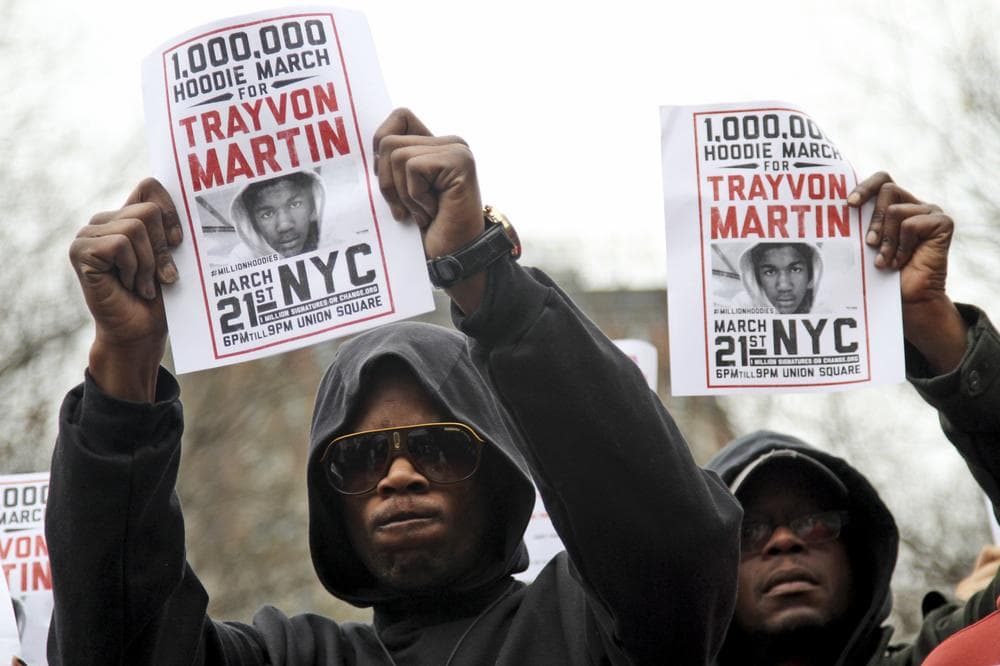Advertisement
Roots Of Racism Remain

Trayvon Martin’s senseless death has rousted the nation from its perpetual slumber on race. Civil rights activists and cultural icons, from Al Sharpton to LeBron James, have expressed solidarity with the latest black teenager to fall victim to racial profiling — profiling that can lead to assault or death.
As a black teenager coming of age in New York City in the 1980s, I was a potential Trayvon Martin or Michael Griffith, the young black man chased by a gang of whites for the crime of being in the predominantly white Howard Beach neighborhood in Queens in 1986. Like Trayvon’s death, the racial controversies of my adolescence were situated against a larger historical narrative. For race has shaped the contours of American society since the republic’s founding.
The heroic period of the civil rights movement, between 1954’s Supreme Court desegregation decision in Brown and 1965’s landmark Voting Rights Act, helped to fundamentally transform American democracy, marking the demise of legal segregation and laying the groundwork for black social, political and economic access in the post-civil-rights era. Martin Luther King Jr. remains the national hero of this narrative, but Emmett Till’s ghost still continues to haunt our collective racial past.
A 14-year-old black teenager visiting family in Money, Miss., in 1955, Till was lynched by a group of whites for defying racial conventions and allegedly speaking out of turn to a white woman. Till’s disfigured body appeared on the cover of Jet Magazine soon after and became a searing example of white supremacy’s impact in postwar America.
Today, just as Till’s death could be traced back to the color of his skin, Trayvon Martin’s tragic ending reminds us of the urgent need to have a long-overdue national conversation about race in America. President Obama’s poignant reminder that if he had a son he would look like Trayvon offers a good starting point.
Calls for recriminations, anger and revenge will do little to aid Trayvon or his family. We can best honor Trayvon’s memory by calling for a sustained conversation about race and racism in the 21st century. It’s a conversation that needs to take place in America’s civic spaces — in libraries, churches and schools — and it’s one that requires the involvement of citizens from all segments of society.
For me, these issues are deeply personal as well as political and professional. As a historian and scholar of the civil rights movement and American political history, I am deeply invested in having history inform the discussion about contemporary race relations. I am the founding director of the new Center for the Study of Race and Democracy at Tufts University, which is designed to examine the role that race plays – historically and today — in the development of democracy in the U.S. and around the world.
When reporters interviewed me just after my appointment, one question kept coming up: “Why the need for a Center for the Study of Race and Democracy?” My answer usually focused on racial inequality’s stubborn persistence, despite Barack Obama’s election and the existence of famous black cultural icons. If asked that question now, I would answer with two simple words: Trayvon Martin.
Some critics have accused Trayvon’s shooter of harboring racial bias. Others have faulted the dead teen-ager for wearing a hoodie, a popular fashion donned by a multicultural generation across America, but with “criminalizing” effects when worn by black men. But debates about the racial symbols lurking behind this tragedy only scratch the surface of a larger conversation about race in American society. Despite racism’s crucial role in forging the republic, we remain reluctant to convene a critical and intellectually informed dialogue about race matters.
In 1963, while languishing in a jail cell in Birmingham, Ala., Martin Luther King Jr. wrote of the civil rights movement transporting America back to “those great wells of democracy” that were dug deep by the nation’s founding fathers. But the architects of American democracy peacefully coexisted alongside chattel slavery and institutional racism, a circumstance that many continue to ignore and deny.
Only fleetingly, even after a civil war and Reconstruction, did the nation widely acknowledge that racism had distorted and disfigured its democratic hopes and dreams. This recognition gained substantive traction only during the 20th-century civil rights movement – a movement that proved both triumphant and tragic enough to jumpstart our last national conversation about race.
That conversation starred presidents and civil rights leaders, ex-convicts and priests, welfare mothers and literary critics. Perhaps Trayvon Martin’s death will now inspire the national dialogue about race that was missing while he lived.
Our current presidential election cycle suggests the exact opposite of such optimistic hopes. Barack Obama, the nation’s first black president, still must campaign against not just a formidable Republican opponent but also the uncanny ability of old racial fears and prejudices to color American politics.
Meanwhile, we’ve seen recent controversies over “hipster racism,” sparked by the HBO series "Girls"; the firestorm after Bruins fans unleashed a torrent of racial slurs against a black hockey player; and the Twitter racism of fans against a black actress in the blockbuster film "The Hunger Games.” All these incidents provide a sober reminder that, nearly four years after President Obama’s election, we remain as distant from a post-racial America as we were before.
This program aired on July 17, 2012. The audio for this program is not available.